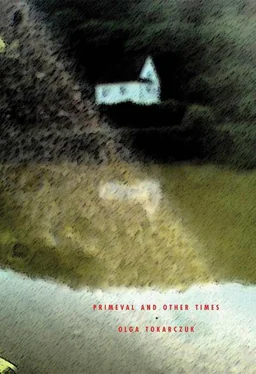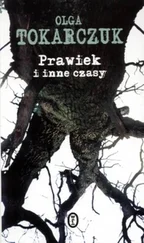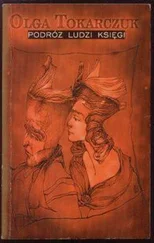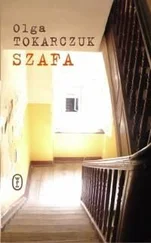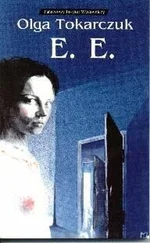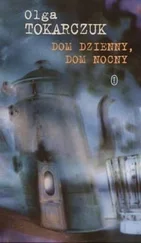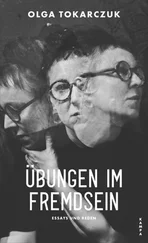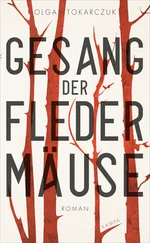He felt like an abandoned child, like a clod of earth thrown on the roadside verge. He lay on his back in the rough, elusive present, and felt that with every passing second he was dissolving into non-existence.
Ruta was even ready to love Ukleja. She could treat him like a large, sick animal. But Ukleja didn’t want her love – he wanted power over her.
Sometimes Ruta felt as if the shaggy Bad Man were sitting inside Ukleja – he lay on top of her the same way as the Bad Man lay on her mother. But whereas her mother let it happen with a smile on her face, it made Ruta feel anger and hatred that grew and swelled like dough. Ukleja always fell asleep on top of her afterwards, and his body gave off a stink of alcohol. Ruta would slide out from under it and go into the bathroom. She would fill the bathtub with water and lie in it until the water went cold.
Ukleja would lock Ruta in the house alone. He left lots of good food for her in the kitchen, from the “Cosy Corner” restaurant: cold chicken, pork knuckle, fish in aspic, vegetable salad, egg mayonnaise, herrings in sour cream – whatever there was on the menu. In Ukleja’s house she lacked nothing. She went from room to room, listened to the radio, changed into her dresses, and tried on shoes and hats. She had two wardrobes filled with clothes, a casket full of gold jewellery, about fifteen hats and dozens of pairs of shoes, so she had been given everything she wanted. To begin with she really thought she would be able to walk about the streets of Taszów in these outfits and parade outside the church in the market square, hear the sighs and catch the glances full of admiration. But Ukleja never let her go out alone. She could only go out with him. And he took her to see his pals and lifted her silk skirts to show off her thighs. Or he took her to the Boskis’ house in Primeval, or to play bridge with the lawyers and secretaries, where she got bored and spent hours staring at her nylon stockings.
Then Ukleja took possession of a camera on a stand and some darkroom equipment from a photographer who owed him money. Ruta soon realised what taking photographs involved. The camera stood in the bedroom, and before getting into bed, Ukleja always set the automatic shutter release. Then in the red light of the darkroom Ruta saw Ukleja’s mounds of flesh, his backside, genitals, and fat breasts bulging like a woman’s, covered in black bristles. She also saw herself crushed and fragmented into breasts, thighs, and belly. So when she was left alone, she put on her dresses and stood perfumed and elegant before the eye of the camera lens.
“Click,” said the camera in admiration.
The passage of time worried Misia in May in particular. May abruptly forced its way into its place in the rank of months and burst forth. Everything began to grow and flower – all at once.
Familiar with the early-spring, tawny-grey view from the kitchen window, Misia couldn’t get used to the day-to-day changes in which May abounded. First of all, in just two days, the meadows went green. Then the Black River shone olive-green and let the light into its waters, which from then on assumed different shades daily. The woods at Papiernia went willow-green, then grass-green, and finally darkened and plunged into shadow.
In May Misia’s orchard blossomed, and that was a sign that she could launder all the clothes, curtains, bedding, mats, napkins, and bedspreads that had gone musty over the winter. She stretched washing lines between the blossoming apple trees and filled the pink-and-white orchard with bright colours. The children, hens, and dogs came toddling after her. Sometimes Izydor came, too, but he always talked about things that didn’t interest her.
In the orchard she thought about the fact that it was impossible to stop the trees from blossoming, and that the petals would inevitably fall, while in time the leaves would go brown and then drop. She wasn’t comforted by the thought that next year the same thing would happen again, because she knew it wasn’t true. Next year the trees would be different – bigger, their branches weightier, the grass would be different, and so would the fruits. This blossoming branch would never be repeated. “Hanging out the washing like this will never be repeated,” she thought. “I shall never be repeated.”
She went back into the kitchen and set about making the dinner, but everything she did seemed to her crude and clumsy. The pierogi were shapeless, the dumplings uneven, the pasta thick and coarse. Peeled clean, the potatoes suddenly got eyes that had to be dug out with the tip of a knife.
Misia was just like the orchard, and like everything in the world that is subject to time. After her third child she grew fat, her hair lost its shine and went straight. Now her eyes were the colour of bitter chocolate.
She was pregnant for the fourth time, and for the first time she thought it was too much for her. She didn’t want this child.
A son was born, to whom she gave the name Marek. He was calm and quiet.
From the start he slept right through the night. He only came to life when he saw her breast. Paweł had gone on yet another course, so Michał looked after Misia in her confinement.
“Four children is a lot for you,” he said. “You should be using some sort of protection. After all, Paweł knows a thing or two about it.”
Soon Misia became certain that Paweł went whoring with Ukleja. Perhaps she shouldn’t resent him for that. First of all she had been pregnant – fat and swollen – then in her confinement, which she took badly. But she did resent him.
She knew he was squeezing and screwing all those barmaids, butcher’s shop girls, and waitresses from the restaurants he monitored as a state official. She found lipstick marks and single long hairs on his shirt. She started noticing alien smells on his things. Finally she found an open packet of condoms, which he never used when they made love.
Misia called Izydor upstairs to the bedroom, and together they divided the big double bed in half. She could see that Izydor liked this idea. He even added something of his own to this new arrangement – he put a flowerpot with a big palm tree in the middle of the room between the beds. Michał watched it all from the kitchen as he smoked a cigarette.
When Paweł came home rather tipsy, Misia went up to him with all four children.
“I’ll kill you if you ever do it again,” she said.
He blinked, but didn’t try pretending not to know what was the matter. Then he threw his boots in the corner and laughed merrily.
“I’ll kill you,” repeated Misia so grimly, that the baby in her arms began to cry pitifully.
In late autumn Marek fell sick with whooping cough and died.
The orchard has two times that are interwoven, succeeding each other year after year. These are the time of the apple tree and the time of the pear tree.
In March, when the ground becomes warm, the orchard begins to vibrate and digs its claw-like, underground paws into the earth’s flesh. The trees suck the earth like puppies, and their trunks become warmer.
In the year of the apple, the trees draw from the earth the sour waters of underground rivers that have the power of change and motion. These waters contain the need to push, to grow and spread.
The year of the pear is completely different. The time of the pear trees involves sucking sweet juices from the minerals, as inside the leaves they gently and gradually merge with the rays of the sun. The trees come to a stop in their growing and relish the sweetness of sheer existence, without moving, without developing. Then the orchard seems unchanging.
Читать дальше
